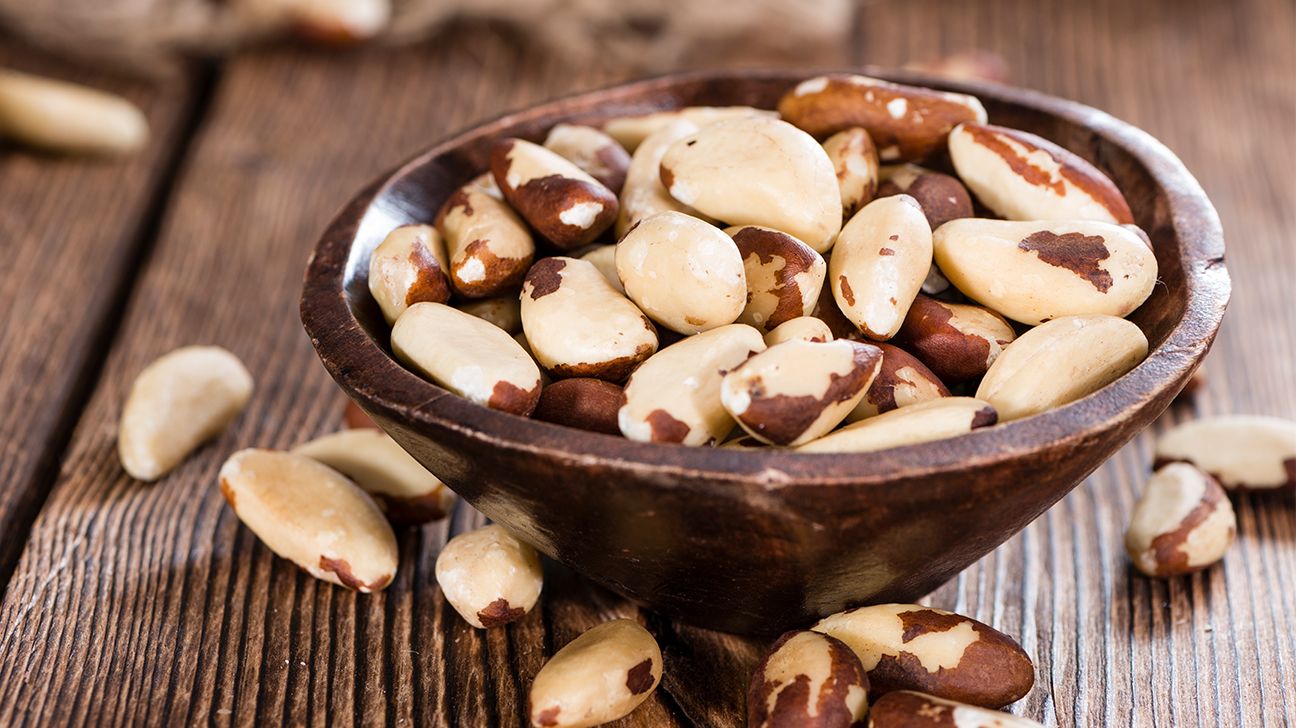Brazil nuts contain beneficial nutrients and minerals, including selenium. They may also help support thyroid function and overall health.

Brazil, or Brazilian, nuts are tree nuts native to the Amazon rainforest in Brazil, Bolivia, and Peru. Their smooth, buttery texture and nutty flavor are typically enjoyed raw or blanched.
Yes, Brazil nuts offer health benefits. Here are the seven most important ones:
1. Nutrition boost
Brazil nuts are very nutritious and energy dense. A 1-ounce (oz) serving of Brazil nuts
- Calories: 187
- Protein: 4.1 grams (g)
- Fat: 19 g
- Carbs: 3.3 g
- Fiber: 2.1 g
- Copper: 55% Daily Value (DV)
- Magnesium: 25% DV
- Phosphorus: 16% DV
- Manganese: 15% DV
- Zinc: 10% DV
- Thiamine: 15% DV
- Vitamin E: 11% DV
Brazil nuts are rich in selenium too. Just one nut contains 96 micrograms (mcg), or 175% of the reference daily intake (RDI). Most other healthy nuts provide less than 1 mcg, on average.
Additionally, Brazil nuts have higher concentrations of:
- magnesium
- copper
- zinc
The exact amounts of these nutrients may vary depending on climate and soil.
Finally, Brazil nuts are an excellent source of healthy fats. In fact,
2. Selenium source
Brazil nuts are a rich source of selenium. A 1-oz nut contains approximately
The DV for selenium is 55 mcg per day for adults. Thus, the average Brazil nut contains
Selenium is a trace element vital for your body’s proper functioning. It’s
Indeed, higher levels of selenium have been
- cancer
- infections
- infertility
- pregnancy
- heart disease
- mood disorders
Although selenium deficiency is rare, some people worldwide may have insufficient intake for optimal functioning. For example, suboptimal selenium status has been
Brazil nuts are a highly effective way to maintain or increase your selenium intake.
3. Thyroid support
Your thyroid is a small, butterfly-shaped gland at the base of your neck. It secretes essential hormones for growth, metabolism, and body temperature regulation.
Thyroid tissue has the highest concentration of selenium — required for the production of the thyroid hormone T3 — as well as proteins that
One Brazil nut per day could deliver enough selenium to support thyroid function.
4. Thyroid disorder management
One large study from 2015 found that people with low selenium levels in China had a significantly higher rate of thyroid diseases, such as hypothyroidism, thyroiditis, and enlarged thyroid, than people with regular levels.
As well as ensuring proper thyroid function, selenium may improve symptoms in people with thyroid disorders.
Low selenium intake may lead to cellular damage, reduced thyroid activity, and autoimmune disorders like Hashimoto thyroiditis and Graves’ disease. It may also increase your chance of thyroid cancer.
Hashimoto thyroiditis is an autoimmune disorder in which the thyroid tissue is gradually destroyed, leading to hypothyroidism and a range of symptoms,
- fatigue
- weight gain
- brain fog
- feeling cold
A
However,
Meanwhile, Graves’ disease is a thyroid disorder in which too much thyroid hormone is produced (hyperthyroidism), leading to
- weight loss
- weakness
- sleeping problems
- bulging eyes
A
The use of Brazil nuts as a selenium source, specifically in people with thyroiditis or Graves’ disease, is limited. Nevertheless, discussing selenium supplementation via Brazil nuts with a healthcare professional may be a good idea.
5. Inflammation reduction
Brazil nuts are rich in antioxidants, which help keep your cells healthy. Antioxidants do this by combating damage caused by reactive molecules called free radicals.
Selenium, vitamin E, and phenols, like gallic acid and ellagic acid, are common antioxidants in Brazil nuts.
Selenium increases levels of an enzyme known as glutathione peroxidase (GPx). GPx may help
6. Heart health
Brazil nuts contain heart-healthy fatty acids, such as polyunsaturated fats, and are rich in antioxidants, minerals, and fiber. All of these nutrients may help lower your risk of heart disease.
Research has indicated that Brazil nuts may improve or reduce:
- vascular inflammation
- oxidative stress
- coagulation
- total cholesterol
- triglycerides
- blood glucose levels
They may also improve HDL (good) cholesterol levels and arterial stiffness.
7. Brain health
Brazil nuts contain ellagic acid and selenium, which can benefit your brain health.
Ellagic acid is a type of polyphenol in Brazil nuts. It has antioxidant and anti-inflammatory properties that may have protective and antidepressant effects on your brain. Selenium may also play a role in brain health by acting as an antioxidant.
In a
Low selenium levels are associated with neurodegenerative diseases, like Alzheimer’s and Parkinson’s.
What’s more, some
Brazil nuts offer impressive health benefits, but eating too many at a time could be harmful.
An intake of 5,000 mcg of selenium, which is the amount in approximately 50 average-sized Brazil nuts, may result in toxicity.
Selenosis (toxicity by selenium)
- breathing problems
- cardiovascular accidents
- kidney failure
Taking too much selenium, particularly from supplements, has also been linked to an increased risk of
The upper level of selenium intake for adults is
Limiting your intake to one to three medium-sized Brazil nuts daily is a smart way to avoid consuming too much selenium.
Additionally, people with some food allergies, including nut allergies, may be allergic to Brazil nuts and need to avoid them.
Brazil nuts are nutritional powerhouses providing healthy fats, antioxidants, vitamins, and minerals. They’re exceptionally high in selenium, a mineral with potent antioxidant properties that’s also good for thyroid, brain, and heart health.
Taking too much selenium may lead to toxicity, though. To avoid consuming too much selenium, limit your intake to one to three medium-sized Brazil nuts daily. If you take any medications, consult a healthcare professional before incorporating Brazil nuts into your routine.




